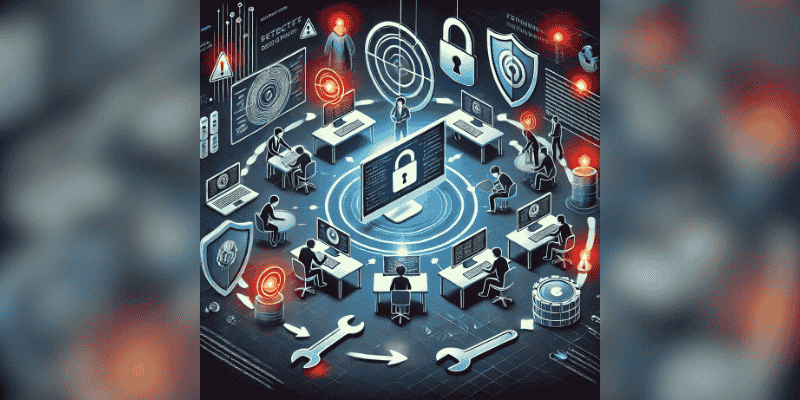
With digital threats on the rise, cybersecurity is no longer optional. Whether you’re protecting personal information or a business, understanding cybersecurity is crucial for safeguarding your digital presence.
In today’s world, where the internet and digital systems have become inseparable from our daily lives—shopping online, managing bank accounts, or conducting business—digital tools offer convenience, but also left significant risks behind. That’s why cybersecurity plays a crucial role in protecting us from cyber incident risks.
So, what exactly is cybersecurity? In simple terms, cybersecurity is the practice of protecting digital assets—from personal information to the vast databases of large companies. In other words, the goal is to safeguard these assets from unauthorized access, ensure their authenticity, and maintain their availability.
Now, to fully grasp how cybersecurity works, let’s break down its core areas to get better understand how this works:
Information Security (InfoSec)
InfoSec, or Information Security, plays a crucial role in cybersecurity. Specifically, it focuses on maintaining the CIA Triad—Confidentiality, Integrity, and Availability—for all sensitive data. In other words, this involves encrypting data to prevent unauthorized access, while also ensuring the information stays intact and accessible to the right people whenever necessary.
- Confidentiality ensures that only authorized individuals can access sensitive information
- Integrity involves keeping the data accurate and untampered.
- Availability means the data must be accessible whenever needed, free from disruptions like cyberattacks

InfoSec plays a crucial role in protecting data, whether it is in storage (at rest) or being transmit to somewhere else (in transit).
Network Security
Think of your network as the central nervous system of any digital environment—it connects devices, ensures smooth communication, and keeps everything running. But without robust Network Security, your system is left exposed, making it easy for unauthorized users to slip in and steal sensitive data. To prevent this, network security employs powerful tools like firewall, IDS, and VPNs:
- Firewalls act as digital gatekeepers, constantly monitoring and controlling the flow of incoming and outgoing network traffic to keep unwanted threats at bay.
- Intrusion Detection Systems (IDS) and Intrusion Prevention Systems (IPS) to identify and prevent cyberattacks. IDS detects suspicious activity, while IPS steps in to stop potential cyberattacks before they cause damage.
- However Virtual Private Networks (VPNs) secure your online activity by encrypting your internet connection, making it harder for anyone to intercept your data.
These powerful tools collaborate seamlessly to guarantee that only authorized users can access your network, also effectively shielding your systems from external threats.
Application Security
In today’s world, companies are constantly developing new software to meet user demands. But as software becomes more complex, so do the risks. Application Security is about making sure that the software companies develop doesn’t have vulnerabilities that hackers can exploit. This includes:
- Regular security testing during development.
- Keeping software up to date with the latest security patches.
- Implementing secure coding practices to prevent potential security flaws.
Whether it’s a mobile app or a large-scale enterprise system, application security is essential to ensure the software you use is safe from attacks.

Endpoint Security
While we often focus on protecting networks and databases, the devices we use—like laptops, smartphones, and tablets—are equally vulnerable to cyberattacks. This is where Endpoint Security comes in. Endpoint security ensures that every device connected to a network is secure from malware, viruses, or other suspicious programs that could compromise your system. We typically achieve this by using:
- Antivirus software to detect and remove malicious files.
- Endpoint protection platforms (EPP) to monitor, detect, and respond to threats on devices.
With strong endpoint security, businesses can protect their devices from becoming weak links in their overall cybersecurity strategy.
Cloud Security
More and more businesses are moving their operations to the cloud due to its scalability and convenience. However, with this shift comes a new set of security challenges. Cloud Security focuses on securing systems, data, and applications that are hosted in cloud environments. This includes:
- Ensuring secure access control so that only authorized users can access the cloud resources.
- Encrypting data stored in the cloud to prevent unauthorized access.
- Using cloud security tools that help identify and mitigate risks specific to cloud infrastructure.
Cloud security is vital for businesses operating in a cloud-based or hybrid-based environment, where part of their infrastructure remains on-premises while others run in the cloud.
Identity and Access Management (IAM)
Have you ever wondered how companies manage access to their sensitive systems? This is the job of Identity and Access Management (IAM). IAM (Identity and Access Management) makes sure that only authorized individuals can access specific systems or information. A key principle of IAM is ‘least privilege’, which means users are granted just enough access to do their jobs—nothing more. For instance, an accountant might have access to financial data, but they wouldn’t be able to view sensitive HR files. To dive deeper, IAM also includes:
- Implementing multi-factor authentication (MFA) to add an extra layer of security.
- Managing user permissions to ensure only authorized individuals have access to specific resources.
Operational Security (OpSec)
Every business process depends on secure digital operations. That’s where Operational Security steps in actively protecting these daily activities from cyber threats. By safeguarding systems and workflows, it ensures businesses continue running smoothly and without disruption. This protection includes:
- Keeping the supply chain safe from attacks.
- Ensuring that critical systems are continuously monitored.
- Managing risks associated with new technologies or processes.
In other words, OpSec plays a crucial role in ensuring that a company’s operations are secure and resilient to cyber threats.

Incident Response and Management
No matter how well-protected a system may be, security incidents can still happen. This is where Incident Response comes in. The goal is to detect and respond to cybersecurity incidents as quickly as possible to minimize damage. Incident response involves:
- Identifying potential threats before they can cause harm.
- Managing active threats to reduce the impact on the business.
- Recovering systems to ensure business continuity and prevent future attacks.
Having a solid incident response plan ensures that when things go wrong, the damage is minimized, and the system can quickly return to normal.
Security Awareness
Last but not least, Security Awareness is all about educating employees and users on how to protect themselves online. Even the best security systems can be compromised if users aren’t aware of safe practices. Cybersecurity awareness programs help teach people to:
- Use multi-factor authentication (MFA) for added protection.
- Avoid phishing attacks by recognizing suspicious emails.
- Use VPNs when connecting to public Wi-Fi.
By raising awareness, companies can ensure that everyone plays a part in maintaining security.
Conclusion: The Importance of Cybersecurity
In conclusion, cybersecurity isn’t solely for tech experts or large corporations. rather, it’s a crucial concern for everyone. By grasping the fundamentals of cybersecurity and recognizing how its various components interact, you empower yourself to take proactive steps in protecting your digital life. Whether you’re focused on securing your personal information or safeguarding your company’s valuable assets, embracing cybersecurity is essential for ensuring a safer digital world for all. Ultimately, staying informed and vigilant can make a significant difference in defending against potential threats.





